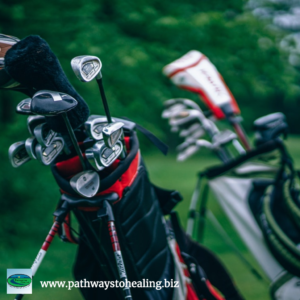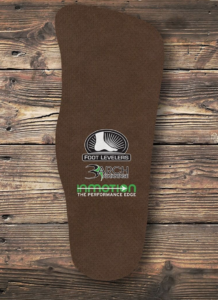By: Alyssa Musgrove – Pathways To Healing
Golf is a challenging and often frustrating sport. Many golfers feel the mental component of the game is their greatest challenge, and undervalue the biomechanics and conditioning required to play the game well and play the game longer. This is a mistake that can lead to poor play and injury.
An extreme amount of compressive force – up to 10 times a person’s body weight – is exerted on the spine during the golf swing. Every joint involved in the swing is taken through its maximum range of motion. Many golfers contort their bodies into oddly twisted postures, generating a great deal of torque. Couple this motion with a bent-over stance, repeat 120 times over three or four hours, add the fatigue that comes with several miles of walking or hot summer weather, and you’ve got a recipe for lower back trouble.
“Most golfers go until they get hurt, then look for help,” says Dr. David Stude, member of the American Chiropractic Association (ACA) Sports Council and founding fellow of the National Golf Fitness Society. “Back pain is a warning sign there is an underlying problem responsible for a symptom that will likely get worse. Doctors of chiropractic look for the cause of the symptom and help reduce the likelihood of future injury.”
There’s a reason Tiger Woods, Phil Mickelson, Jack Nicklaus and Arnold Palmer have all relied on chiropractic care throughout their careers. Tiger Woods has said, “…lifting weights and seeing a chiropractor on a regular basis has made me a better golfer. I’ve been going to chiropractors for as long as I can remember. It is as important to my training as practicing my swing is.”
Aside from regular chiropractic adjustments, Dr. Stude and the ACA suggest these simple measures to help you avoid back pain or injury, and improve your overall game:
 Purchase equipment that fits. Don’t adapt your swing to the wrong clubs. Someone six feet tall playing with irons designed for someone five inches shorter is begging for back trouble.
Purchase equipment that fits. Don’t adapt your swing to the wrong clubs. Someone six feet tall playing with irons designed for someone five inches shorter is begging for back trouble.- For women: If you have “inherited” your significant other’s golf clubs, beware. Not only are the clubs likely too long, the shaft is often not flexible enough for a woman’s grip. Women play better with clubs composed of lighter, more flexible material, such as graphite.
- For men: While men are traditionally stronger than women, they usually aren’t as flexible. Men should spend extra time stretching before and after play to increase trunk flexibility. Improved flexibility helps men maintain a more even and consistent swing plane, which leads to more consistent performance.
- For senior golfers: If you show signs of arthritis in the hands, consider a larger, more specialized grip for added safety and performance.
- Take lessons. Learning proper swing technique is critical. At the end of the swing, you want to be standing up straight; the back should not be twisted.
- Wear orthotics. These shoe inserts support the arch, absorb shock, and increase coordination. Studies show custom-made, flexible orthotics can improve the entire body’s balance, stability and coordination. This translates into a smoother swing and reduced fatigue.
-
Warm up before each round. Stretching before and after 18 holes is the best way to reduce post-game stiffness and soreness. Take a brisk walk to get blood flowing to the muscles; then do a set of stretches. To set up a quality stretching and/or exercise routine, see a chiropractor or golf pro who can evaluate your areas of tension and flexibility.
- Pull, don’t carry, your golf bag. Carrying a heavy bag for 18 holes can cause the spine to be compressed, leading to disc problems and nerve irritation. If you prefer to ride in a cart, alternate riding and walking every other hole. Bouncing in a cart can be hard on the spine.
- Keep your entire body involved. Every third hole, take a few practice swings backwards and with the opposite hand to balance out the stress put on the back and rest of the body. Imagine going to the gym and working only one side of your body everyday for years, neglecting the opposite side. Golf tends to create this same type of imbalance in your spinal column, setting the stage for injury.
- Drink lots of water, especially in the heat. Dehydration causes early fatigue. When fatigued, we compensate by adjusting our swing, which increases the risk of injury. Smoking or drinking alcoholic beverages while golfing also causes dehydration.
If you golf consistently, you will no doubt feel the stress of the game. But by following a few simple prevention tips, it is possible to play pain-free. Chiropractic care is an effective solution for golfers who seek to rid themselves of pain and have a successful and enjoyable golf game!
 Pathways to Healing specializes in holistic chiropractic care. Dr. Alyssa Musgrove draws on a variety of techniques, including chiropractic, kinesiology, nutrition, food allergy testing and lifestyle counseling to assist clients in achieving optimal health and wellness in one setting. Pathways to Healing is located at 1022 Founders Row, Lake Oconee Village, Greensboro. The office can be reached at 706-454-2040.
Pathways to Healing specializes in holistic chiropractic care. Dr. Alyssa Musgrove draws on a variety of techniques, including chiropractic, kinesiology, nutrition, food allergy testing and lifestyle counseling to assist clients in achieving optimal health and wellness in one setting. Pathways to Healing is located at 1022 Founders Row, Lake Oconee Village, Greensboro. The office can be reached at 706-454-2040.

